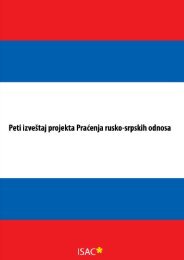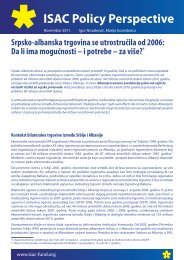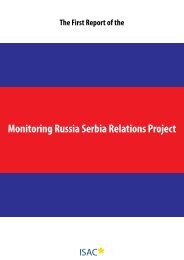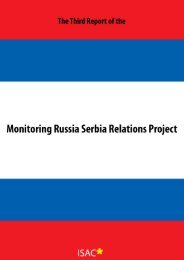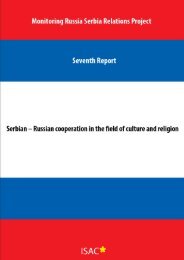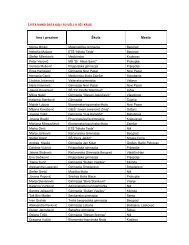the process of security sector reform - ISAC Fund
the process of security sector reform - ISAC Fund
the process of security sector reform - ISAC Fund
You also want an ePaper? Increase the reach of your titles
YUMPU automatically turns print PDFs into web optimized ePapers that Google loves.
Angus Morris REFORM OF THE ARMED FORCES<br />
Angus Morris REFORM OF THE ARMED FORCES<br />
In summary, <strong>the</strong> need is for transparency, accountability, appropriateness and<br />
affordability. These requirements are included, with o<strong>the</strong>r details, in Euro-<br />
Atlantic organisational joining parameters. Many Central and Eastern European<br />
nations who have been through <strong>the</strong> joining procedures for NATO PfP and or<br />
EU membership have found <strong>the</strong> programmed entry <strong>process</strong> itself to be a helpful<br />
guide to defence <strong>reform</strong>.<br />
One <strong>of</strong> <strong>the</strong> biggest challenges in a major review is that <strong>the</strong>re may need to be a<br />
fundamental change <strong>of</strong> <strong>the</strong> way people go about <strong>the</strong>ir military business – in effect,<br />
a culture change. This may only be brought about successfully by a combination<br />
<strong>of</strong> clear vision, effective communication <strong>of</strong> that vision, and an inclusive <strong>process</strong><br />
<strong>of</strong> discussion during <strong>the</strong> review <strong>process</strong> and throughout implementation. Even<br />
<strong>the</strong>n, some flexibility will be needed, as external events <strong>of</strong>ten impact change<br />
during even <strong>the</strong> <strong>process</strong> <strong>of</strong> <strong>the</strong> review itself. Finally, patience and tenacity will<br />
be necessary to see things through. And all <strong>of</strong> that is a lot to ask <strong>of</strong> all <strong>the</strong> stakeholders<br />
in this strategically important <strong>process</strong>.<br />
Some examples <strong>of</strong> less than successful defence reviews include: those done<br />
for short-term political gain; for economic reasons alone; where <strong>the</strong> defence<br />
<strong>sector</strong> has driven change without broad support; where accountability and<br />
transparency are ignored; and where illogical single service issues prevail. In<br />
<strong>the</strong> end, <strong>the</strong>se types <strong>of</strong> defence reviews tend to fail – as do those which are<br />
inadequately resourced and championed.<br />
THE NECESSITY OF THE ARMED FORCES OF<br />
SERBIA AND MONTENEGRO TO REFORM<br />
The decision on whe<strong>the</strong>r or not to <strong>reform</strong> <strong>the</strong> armed forces <strong>of</strong> Serbia and<br />
Montenegro can only be for <strong>the</strong> Government and <strong>the</strong> people <strong>of</strong> Serbia and<br />
Montenegro to make. No one else should make that decision for any country.<br />
This decision is strategically important – it will impact on <strong>the</strong> international view<br />
<strong>of</strong> how Serbia and Montenegro is progressing. It is also vitally important right<br />
down to <strong>the</strong> individual level – personal <strong>security</strong> is at <strong>the</strong> heart <strong>of</strong> everyone’s key<br />
goals in life. And <strong>the</strong> Government <strong>of</strong> Serbia and Montenegro has made <strong>the</strong>ir<br />
commitment to Armed Forces <strong>reform</strong> very clear. So, it is already underway.<br />
Such <strong>reform</strong>, if conducted in an appropriate way, as it appears to be being<br />
done, will also involve <strong>the</strong> whole community, some in only a small way, o<strong>the</strong>rs<br />
considerably. This is <strong>the</strong> major reason to let people know early on why <strong>reform</strong> is<br />
needed, what is being done and when, and who is to be involved and how <strong>the</strong>y<br />
can be heard should <strong>the</strong>y so desire.<br />
There should be some confidence gained from <strong>the</strong> fact that many o<strong>the</strong>r countries,<br />
including near-neighbours and friends, have gone through a similar review<br />
<strong>process</strong> in <strong>the</strong> recent past. There is much to be gleaned from o<strong>the</strong>rs and help<br />
is being <strong>of</strong>fered freely and with <strong>the</strong> best <strong>of</strong> motives. Once a Government has<br />
made its vision for <strong>reform</strong> clear, as Serbia and Montenegro has, <strong>the</strong>y will find<br />
more help <strong>of</strong>fered than <strong>the</strong>y can deal with. A critical step is to decide how to<br />
co-ordinate such advice and <strong>of</strong>fers <strong>of</strong> help. Whatever is <strong>of</strong>fered, it is vital that<br />
<strong>the</strong> <strong>reform</strong>ing Government remains fully in charge <strong>of</strong> <strong>the</strong> <strong>process</strong>; <strong>the</strong>y must<br />
visibly own <strong>the</strong> review itself, and <strong>the</strong> resulting plans for its implementation. It<br />
is necessary to be selective to ensure that <strong>the</strong> support <strong>of</strong>fered is consistent with<br />
transformation goals. In o<strong>the</strong>r words it is demand led, not supply driven.<br />
And <strong>the</strong>y must take <strong>the</strong>ir time over such a strategically important issue; <strong>the</strong>y<br />
should not be rushed, seeking or being forced into unnecessarily restrictive<br />
deadlines. They should decide how <strong>the</strong>y wish to conduct <strong>the</strong> review, who <strong>the</strong>y<br />
want advice from, how it will be brought toge<strong>the</strong>r in an efficient and productive<br />
way and how <strong>the</strong>y will manage <strong>the</strong> cultural change that will be necessary, not<br />
just within <strong>the</strong> Armed Forces, but in o<strong>the</strong>r Government Departments, in Civil<br />
Society and throughout <strong>the</strong> country. And <strong>the</strong>y must have <strong>the</strong> courage, tenacity<br />
and patience to see <strong>the</strong> <strong>process</strong> through.<br />
SUMMARY<br />
Many and varied agencies are permitted to use armed force. When <strong>reform</strong>ing<br />
<strong>security</strong> <strong>sector</strong> elements, basic change management <strong>the</strong>ory and practice should<br />
be employed. Critical to this is top-level political buy-in to <strong>the</strong> <strong>process</strong> <strong>of</strong><br />
<strong>reform</strong>. All personnel and supervisors involved in <strong>the</strong> use <strong>of</strong> armed force should<br />
work under <strong>the</strong> principles <strong>of</strong> good governance. Technical competence is key,<br />
as are transparency, accountability, appropriateness and affordability. It is for<br />
<strong>the</strong> Government and people <strong>of</strong> Serbia and Montenegro to decide how <strong>the</strong>y<br />
should conduct <strong>the</strong>ir defence review. There is a role for civil society as well as<br />
46 47







